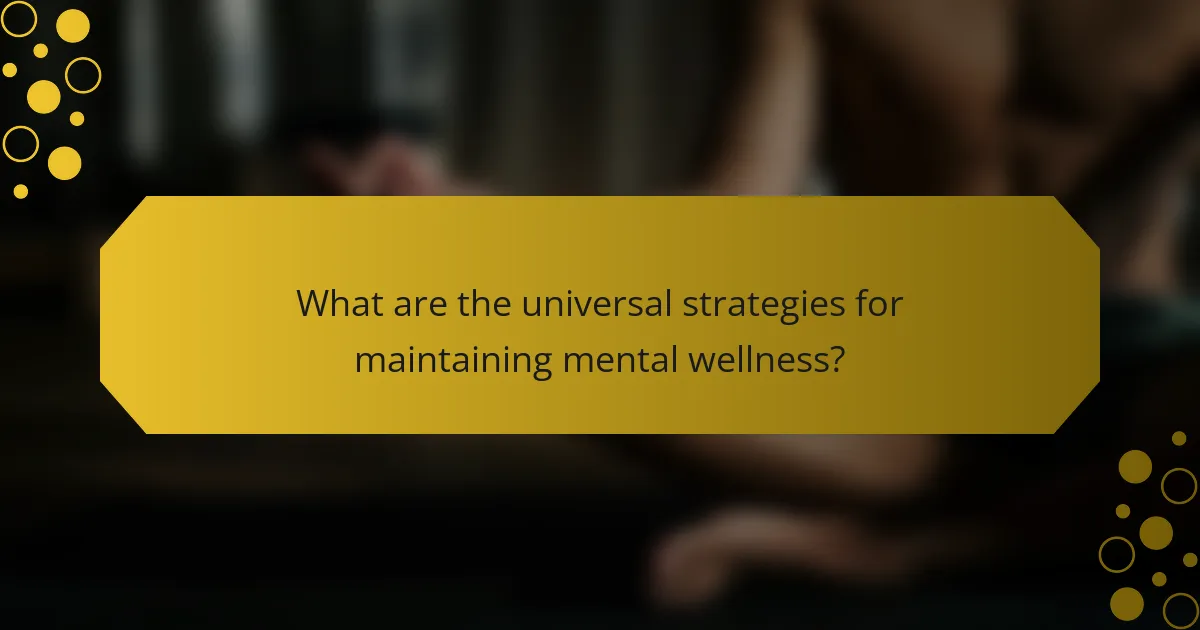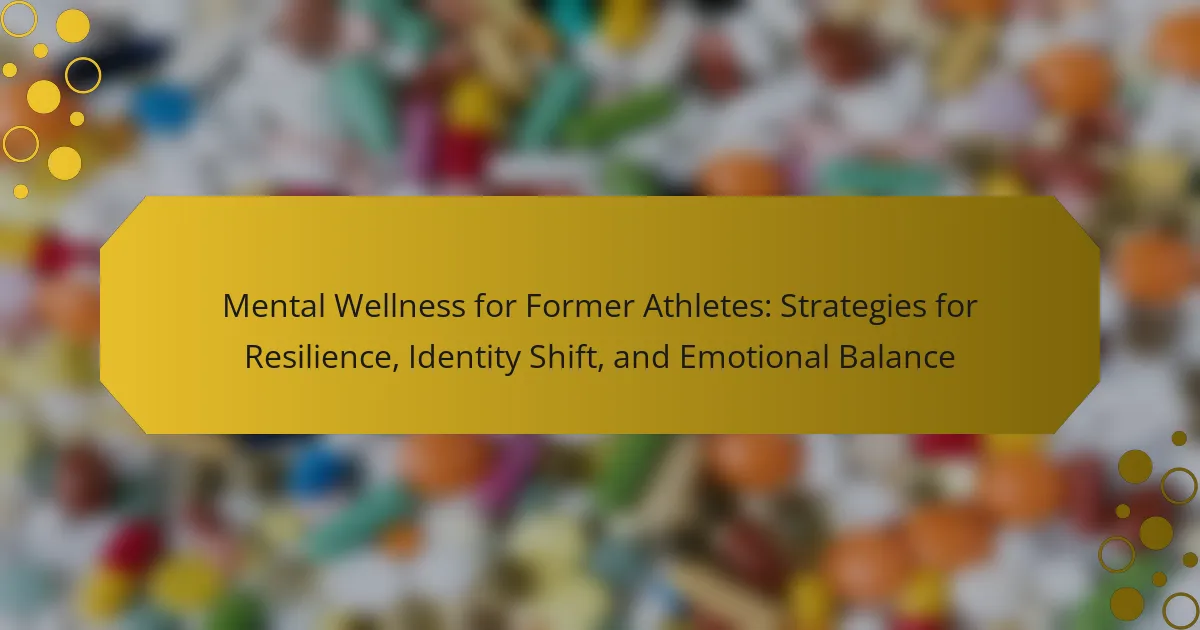Mental wellness is crucial for former athletes facing unique challenges like identity loss and emotional instability. This article explores strategies for resilience, the importance of social support, and the role of mindfulness in achieving emotional balance. It highlights the need for self-reflection and establishing new routines to combat feelings of isolation. Understanding these aspects can significantly enhance mental health outcomes during the transition from competitive sports to retirement.

How does mental wellness impact former athletes?
Mental wellness significantly impacts former athletes by influencing their emotional balance, identity, and resilience. Transitioning from a competitive sports career can lead to identity shifts, which may cause anxiety and depression. Developing coping strategies, such as mindfulness and social support, helps mitigate these effects. Research indicates that 40% of former athletes experience mental health challenges post-retirement, highlighting the importance of targeted mental wellness programs. Engaging in community activities fosters a sense of belonging, which is crucial for emotional stability.
What are the common mental health challenges faced post-career?
Common mental health challenges faced post-career include identity loss, anxiety, and depression. Former athletes often struggle with redefining their self-worth outside of sports. A unique attribute is the emotional toll from abrupt transitions, leading to feelings of isolation. Resilience strategies such as therapy, peer support, and mindfulness can aid in emotional balance. As a result, addressing these challenges is essential for mental wellness.
How can resilience be developed after leaving sports?
Resilience can be developed after leaving sports through focused strategies that enhance mental wellness. Former athletes can benefit from establishing new routines, seeking social support, and engaging in mindfulness practices. Identifying transferable skills from sports to everyday life fosters a sense of identity and purpose. Setting achievable goals promotes emotional balance and encourages a proactive approach to challenges. Regular reflection on experiences helps in processing emotions and reinforcing resilience.
What strategies can enhance emotional resilience?
Practicing mindfulness, building a support network, and engaging in physical activity can enhance emotional resilience. These strategies foster a sense of control, connection, and well-being. Mindfulness techniques, such as meditation, improve self-awareness and emotional regulation. A strong support network provides encouragement and shared experiences, while regular physical activity releases endorphins, reducing stress. Implementing these strategies promotes a balanced emotional state for former athletes navigating identity shifts.
What role does identity play in the transition from athlete to civilian?
Identity significantly influences the transition from athlete to civilian by shaping self-perception and emotional well-being. Former athletes often experience an identity crisis as they move away from a structured sports environment. This shift can lead to feelings of loss and confusion about their purpose.
Mental wellness strategies are essential during this transition. Engaging in new activities helps redefine identity, fostering resilience. Social support networks provide emotional balance, aiding in the adjustment process. Establishing new goals creates a sense of direction, which is crucial for maintaining mental health.
The unique attribute of self-identity plays a central role in this transition. Athletes must navigate their past achievements while embracing new roles in civilian life. This delicate balance is vital for emotional stability and long-term well-being.
In summary, identity profoundly impacts former athletes’ mental wellness during their transition. Implementing effective strategies can facilitate a smoother adjustment and promote resilience in their new lives.
How can former athletes redefine their identity?
Former athletes can redefine their identity by embracing new roles and interests beyond sports. Engaging in community activities fosters connection and purpose. Developing new skills enhances self-esteem and adaptability. Seeking professional support, such as counseling, can facilitate emotional balance and identity exploration. Building a support network with peers aids in navigating this transition effectively.
What unique mental health resources are available for retired athletes?
Retired athletes have access to unique mental health resources tailored to their specific experiences. These resources include specialized counseling services that understand the psychological impact of retirement, peer support groups that foster community and shared experiences, and workshops focused on identity transition and coping strategies. Additionally, many organizations offer mental health hotlines and online platforms for immediate support. These resources address the unique attribute of identity shift, providing essential strategies for resilience and emotional balance.

What are the universal strategies for maintaining mental wellness?
To maintain mental wellness, former athletes can adopt strategies that promote resilience, identity adjustment, and emotional balance. These include establishing a support network, engaging in mindfulness practices, setting new personal goals, and embracing a balanced lifestyle.
Prioritizing social connections helps to combat feelings of isolation. Mindfulness techniques, such as meditation, enhance emotional regulation. Setting achievable goals fosters a sense of purpose. Maintaining physical health through regular exercise and nutrition contributes to overall well-being.
Incorporating these strategies can significantly improve mental health outcomes for former athletes.
How does physical activity contribute to mental health post-career?
Physical activity significantly enhances mental health for former athletes by fostering resilience, aiding identity shifts, and promoting emotional balance. Regular exercise releases endorphins, which improve mood and reduce stress. Additionally, maintaining an active lifestyle can help individuals redefine their sense of purpose post-career, facilitating a smoother transition into new life stages. Engaging in group activities or team sports can also strengthen social connections, further supporting mental wellness. Overall, physical activity serves as a vital tool in navigating the psychological challenges faced after a sports career.
What are the benefits of therapy and counseling for former athletes?
Therapy and counseling provide crucial mental wellness support for former athletes, aiding in resilience and emotional balance. These services help individuals navigate identity shifts after sports careers, fostering self-awareness and coping strategies. Additionally, therapy can reduce anxiety and depression rates, enhancing overall life satisfaction. Engaging in these practices promotes healthier relationships and improved communication skills, essential for personal and professional growth post-athletics.
What types of therapy are most effective for this demographic?
Cognitive-behavioral therapy (CBT) and mindfulness-based therapy are most effective for former athletes. These approaches address identity shifts and emotional balance, promoting resilience. CBT focuses on changing negative thought patterns, while mindfulness enhances self-awareness and emotional regulation. Both therapies have shown significant success in improving mental wellness among this demographic.
How can social support networks aid in the transition?
Social support networks significantly aid former athletes in their transition by providing emotional and practical assistance. These networks foster a sense of belonging, which is crucial for mental wellness during identity shifts.
Support from peers, coaches, and family members helps mitigate feelings of isolation. Engaging with others who share similar experiences can enhance resilience and facilitate coping strategies. Studies show that strong social connections correlate with improved emotional balance and reduced stress levels.
Additionally, support groups tailored for former athletes can offer unique insights and resources. Such groups often share strategies for navigating challenges, promoting a smoother transition into post-athletic life.

What unique challenges do retired athletes face regarding mental health?
Retired athletes face unique mental health challenges, including identity loss, isolation, and depression. The transition from an active sports career to retirement can create a significant identity shift. Many athletes struggle to redefine their purpose outside of their sport, leading to feelings of emptiness.
Additionally, the lack of daily structure and social interactions can result in isolation. The sudden absence of a team environment often exacerbates loneliness. Many retired athletes also experience anxiety and depression, which can stem from physical injuries or the pressure of maintaining a competitive mindset.
To address these challenges, strategies for resilience include seeking professional mental health support, engaging in new hobbies, and fostering connections with other retired athletes. Building a support network can provide a sense of belonging and facilitate the transition to a fulfilling post-sport life.
How do financial pressures affect mental wellness after sports?
Financial pressures significantly impact mental wellness for former athletes by increasing stress and anxiety levels. These pressures can lead to identity crises, as athletes often struggle to redefine their self-worth outside of sports. Research indicates that nearly 30% of retired athletes experience mental health issues tied to financial instability. Strategies to mitigate these effects include financial planning, seeking professional help, and building a support network. Addressing financial concerns can enhance emotional balance and foster resilience during this challenging transition.
What is the impact of loss of structure on mental health?
The loss of structure significantly impacts mental health by increasing feelings of uncertainty and anxiety. Former athletes often struggle with identity shifts after leaving competitive sports, which can lead to emotional instability. This transition may result in a lack of purpose and direction, exacerbating mental health issues. Research shows that maintaining a routine can mitigate these effects, helping individuals regain a sense of control and stability. Engaging in structured activities fosters resilience and supports emotional balance during this challenging period.
How can establishing a new routine help?
Establishing a new routine significantly enhances mental wellness for former athletes. It provides structure, fosters discipline, and promotes a sense of purpose. A consistent routine can alleviate feelings of loss and identity crisis, commonly faced after transitioning from competitive sports. Engaging in regular physical activity within this routine supports emotional balance and resilience. Moreover, incorporating mindfulness practices can further enhance mental clarity and emotional regulation.
What role does public perception play in mental health for former athletes?
Public perception significantly influences mental health for former athletes. Positive societal views can enhance their self-esteem and facilitate smoother transitions into post-sport identities. Conversely, negative perceptions may lead to stigma, affecting emotional well-being and resilience. Research shows that former athletes often grapple with identity shifts, making public support crucial for their mental wellness. Engaging in community outreach and advocacy can reshape perceptions, promoting a healthier dialogue around their experiences.

What rare attributes influence mental health outcomes for former athletes?
Rare attributes influencing mental health outcomes for former athletes include identity loss, social isolation, and lack of purpose. These factors uniquely affect emotional resilience and can lead to anxiety or depression. The transition from competitive sports often creates a void, challenging their self-worth and community connections. Understanding these attributes is crucial for developing targeted support strategies that enhance mental wellness and facilitate recovery.
How does the level of competition affect post-career mental health?
The level of competition significantly impacts post-career mental health for former athletes. High competition can lead to intense identity shifts and emotional challenges after retirement. Athletes often struggle with feelings of loss and diminished self-worth when transitioning away from their sport. Research shows that those who experience a higher level of competition may face greater anxiety and depression rates post-career.
Strategies for resilience include building a supportive network, engaging in new interests, and seeking professional help if needed. Developing a new identity outside of sports is crucial for emotional balance. Athletes should focus on their unique attributes and strengths to redefine their self-worth and purpose in life after competition.
What unique experiences do elite athletes face compared to amateur athletes?
Elite athletes face unique experiences related to mental wellness, including heightened pressure and identity challenges. Unlike amateur athletes, they often deal with intense public scrutiny and expectations. This can lead to significant emotional stress and a struggle with identity post-career. Elite athletes may also experience a more profound sense of loss when transitioning away from their sport, impacting their mental resilience. Strategies for maintaining emotional balance are crucial for both groups, but elite athletes require tailored approaches to address their specific challenges.

What are the best practices for ensuring mental wellness after sports?
To ensure mental wellness after sports, former athletes should engage in self-reflection, establish new routines, and seek social support. These strategies foster resilience and emotional balance during identity shifts.
Self-reflection involves acknowledging feelings of loss and redefining personal identity outside of sports. Establishing new routines helps create a sense of normalcy and purpose. Seeking social support, whether through friends, family, or support groups, provides a vital network for sharing experiences and coping strategies.
Incorporating mindfulness practices can further enhance emotional well-being. Regular physical activity, even outside competitive sports, maintains mental health and supports a positive mindset.
Finally, professional counseling can offer tailored strategies for managing anxiety and depression that may arise during this transition.
How can former athletes create a sustainable mental health plan?
Former athletes can create a sustainable mental health plan by focusing on structured routines, social support, and professional guidance. Establishing daily habits promotes stability and reduces stress. Engaging with peers and support groups fosters connection and shared experiences. Seeking therapy or counseling provides tailored strategies for navigating identity shifts and emotional challenges. Integrating physical activity into routines enhances mood and resilience. Regular self-reflection helps in understanding personal growth and maintaining emotional balance.
What common mistakes should be avoided during the transition?
To ensure a successful transition, avoid common mistakes such as neglecting emotional health, failing to establish a new identity, and overlooking support systems. Many former athletes struggle with these aspects, leading to feelings of isolation and confusion. Prioritize self-reflection, seek professional guidance, and engage with peers who understand the journey. Recognizing these pitfalls can foster resilience and emotional balance during the adjustment period.
What expert insights can guide former athletes in their mental health journey?
Former athletes can benefit from expert insights that emphasize the importance of mental resilience, identity transition, and emotional balance. Strategies include establishing new routines, seeking professional support, and engaging in community activities. These approaches help to navigate the psychological challenges following their sports careers. Additionally, mindfulness practices can enhance emotional regulation and self-awareness, fostering a healthier mental state. Emphasizing the value of social connections and peer support can further aid in the adjustment process.
